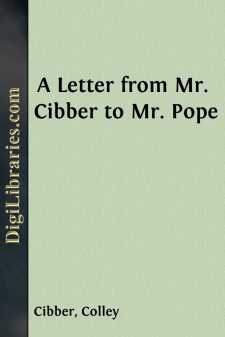Categories
- Antiques & Collectibles 13
- Architecture 36
- Art 48
- Bibles 22
- Biography & Autobiography 813
- Body, Mind & Spirit 142
- Business & Economics 28
- Children's Books 15
- Children's Fiction 12
- Computers 4
- Cooking 94
- Crafts & Hobbies 4
- Drama 346
- Education 46
- Family & Relationships 57
- Fiction 11828
- Games 19
- Gardening 17
- Health & Fitness 34
- History 1377
- House & Home 1
- Humor 147
- Juvenile Fiction 1873
- Juvenile Nonfiction 202
- Language Arts & Disciplines 88
- Law 16
- Literary Collections 686
- Literary Criticism 179
- Mathematics 13
- Medical 41
- Music 40
- Nature 179
- Non-Classifiable 1768
- Performing Arts 7
- Periodicals 1453
- Philosophy 64
- Photography 2
- Poetry 896
- Political Science 203
- Psychology 42
- Reference 154
- Religion 513
- Science 126
- Self-Help 84
- Social Science 81
- Sports & Recreation 34
- Study Aids 3
- Technology & Engineering 59
- Transportation 23
- Travel 463
- True Crime 29
A Letter from Mr. Cibber to Mr. Pope
by: Colley Cibber
Description:
Excerpt
INTRODUCTION
In the twentieth century, Colley Cibber’s name has become synonymous with “fool.” Pope’s Dunciad, the culmination of their long quarrel, has done its work well, and Cibber, now too often regarded merely as a pretentious dunce, has been relegated to an undeserved obscurity.
The history of this feud is replete with inconsistencies.
The image Cibber presents of himself as a charming, good-natured, thick-skinned featherbrain is as true as Pope’s of himself as a patient, humorous, objective moralist. Each picture is somewhat manipulated by its creator. The reasons behind the manipulation are less matters of outright untruth than of complex personalities disclosing only what they regard as pertinent. Cibber, the actor, always tries to charm his audience; Pope, the satirist, proffers those aspects best suited to his moral purpose.Although the fact of their differences is evident in Pope’s writings after 1730, explanations of the cause, continuation and climax tend to be muddled. The cause generally cited is Cibber’s story in the Letter concerning Three Hours after Marriage and The Rehearsal. This is not only a one-sided version, it is not even strongly substantiated. As Norman Ault pointed out, it was not reported in any of the periodicals at a time when such incidents were seized upon by journalists hungry for gossip. The only confirmation aside from Cibber is Montagu Bacon’s letter to his cousin James Montagu, which gives a slightly less vivacious account:
‘I don’t know whether you heard, before you went out of town, that The Rehearsal was revived ... and Cibber interlarded it with several things in ridicule of the last play, upon which Pope went up to him and told him he was a rascal, and if he were able he would cane him; that his friend Gay was a proper fellow, and if he went on in his sauciness he might expect such a reception from him. The next night Gay came accordingly, and, treating him as Pope had done the night before, Cibber very fairly gave him a fillip on the nose, which made them both roar. The Guards came and parted them, and carried away Gay, and so ended this poetical scuffle.’
A more likely cause is the second story in the Letter, the visit to the bawdy house. If, as Ault goes on to suggest, there is even a shadow of truth in it, Pope’s attitude, as well as his reluctance to reveal its cause, is understandable. The question then becomes: why did he continually provoke Cibber, knowing the latter had such a story at hand? This, however, might not be so illogical as it appears. Pope’s work in the thirties abounds in sneers at the actor, but none of them is equal in scale to the full attack launched against Theobald. In comparison with the 1735 portraits of Atticus and Sporus, the comments on Cibber are minor barbs that could be ignored by a man whose reputation was secure in its own right. Cibber evidently believed he was in such a position, for he offered no defense before 1740, and took no offensive action before 1742....


